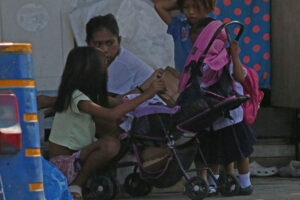
Two million Filipino children living in severe food poverty — UNICEF
AROUND TWO MILLION Filipino children are living in severe food poverty, putting them at risk of malnutrition, according to a new report by the United Nations Children’s Fund (UNICEF).
In a report entitled “Child Food Poverty: Nutrition deprivation in early childhood,” UNICEF said 18% of Filipino children under five years old, equivalent to two million, are considered severely food poor since they consume two or fewer of the eight major food groups a day.
The eight food groups include breastmilk, grains and roots, pulses and nuts, dairy products, meat, poultry and fish, eggs, Vitamin A-rich fruits and vegetables, and other fruits and vegetables.
“Four out of five children in this situation are fed only breastmilk/milk and/or a starchy staple, such as rice, corn, or wheat. Less than 10% of these children are fed fruits and vegetables. And less than 5% are fed nutrient-dense foods such as eggs, fish, poultry, or meat,” it said.
At the same time, 35% of Filipino children under five are living in “moderate food poverty” which means they consume three to four food groups a day.
“Children living in severe food poverty are children living on the brink. This can have an irreversible negative impact on their survival, growth, and brain development. Children who consume just rice and some vegetable soup a day are up to 50% more likely to experience severe forms of malnutrition,” UNICEF Representative to Philippines Oyunsaikhan Dendevnorov said in a statement.
UNICEF said there are 440 million children under five years old that are living in food poverty around the world. Of this total, 181 million children are living in severe food poverty.
The Philippines is one of 20 countries that account for 65% of the children living in severe food poverty globally, it said.
“Almost two-thirds of the total number of children living in severe child food poverty are concentrated in just 20 of these countries: Afghanistan, Bangladesh, China, Côte d’Ivoire, the Democratic Republic of the Congo, Egypt, Ethiopia, Ghana, India, Indonesia, Myanmar, the Niger, Nigeria, Pakistan, the Philippines, Somalia, South Africa, Uganda, the United Republic of Tanzania and Yemen,” it said.
Severe food poverty is not just driven by the inability to buy nutritious food, but also the failure to sustain positive feeding practices.
“Nearly half (46%) of all cases of severe child food poverty are among poor households where income poverty is likely to be a major driver, while 54% — or 97 million children — live in relatively wealthier households, among whom poor food environments and feeding practices are the main drivers of food poverty in early childhood,” it said.
An “alarming” proportion of children in severe food poverty are consuming more “cheap, nutrient-poor” ultra-processed foods and sugar-sweetened beverages, UNICEF said.
“Consumption of unhealthy products was particularly high in Egypt, Kenya, Kyrgyzstan, Lebanon, Nepal and the Philippines, where more than one in five children consumed an unhealthy food and/or sweet beverage — despite these children consuming two or fewer food groups per day,” it said.
To address food poverty, UNICEF urged the government to ensure the availability of affordable food products and to use health systems to deliver nutrition services to prevent and treat malnutrition in early childhood.
The government should also provide cash, food or voucher subsidies to support poorer households, UNICEF said. — B.M.D.Cruz



